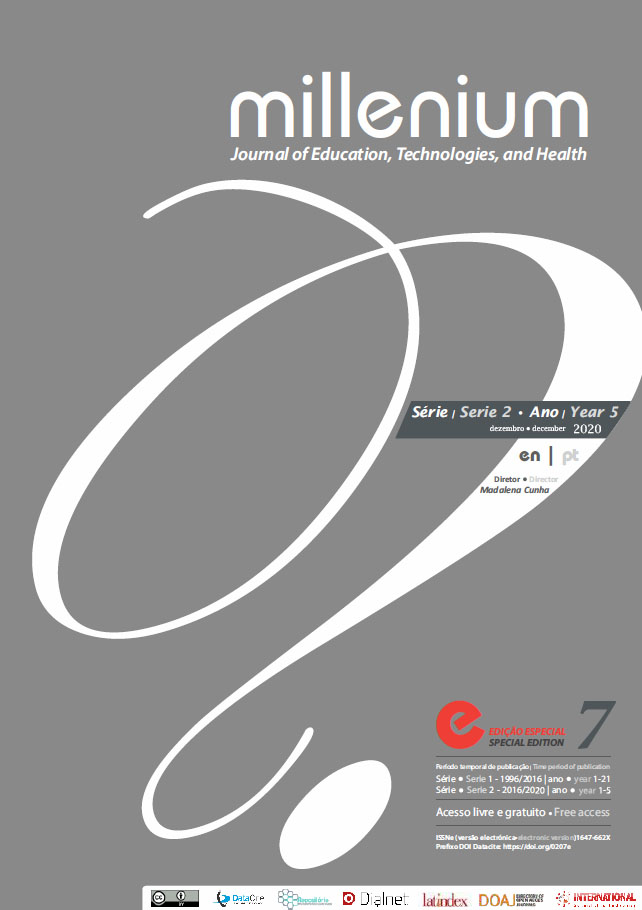Formas de percibir la estructura de un programa de mentoría
DOI:
https://doi.org/10.29352/mill0207e.04.00385Palabras clave:
inclusión, tutoría, estructura del programa, acogida de estudiantes de educación superiorResumen
Introducción: En el marco del proyecto “Verano con ciencia”, financiado por la Fundación para la Ciencia y la Tecnología (FCT), el presente trabajo tuvo como objetivo desarrollar una guía orientadora para la creación e implementación de un Programa de Mentoría (PM), mientras promotor de prácticas de inclusión en todas las Unidades Orgánicas (UO) de la institución de Ensino Superior.
Objetivos: Este artículo científico tiene como objetivo: (i) Caracterizar el Programa de Mentoría implementado en el Instituição de Ensino Superior a través del proyecto piloto en dos Unidades Orgánicas; (ii) Comparar la estructura del PM implementado, con otras experiencias y programas similares en otras instituciones de educación superior; (iii) Presentar una propuesta para la implementación de una estructura de PM en el Instituição de Ensino Superior, a partir de septiembre de 2020, de acuerdo con las mejoras y limitaciones identificadas, tanto en el proyecto piloto como en experiencias similares en las Universidades de Lisboa y Oporto.
Métodos: Estudio descriptivo y exploratorio, de carácter cualitativo. Análisis de los datos recopilados en el proyecto piloto “Prácticas inclusivas en el Instituição de Ensino Superior”, así como datos recopilados a través de entrevistas semiestructuradas, con dos mentores y cuatro mentores involucrados en proyectos de mentoría en otras instituciones de educación superior, con especial énfasis en la información relacionada con caracterización de la implementación de PM. Revisión bibliográfica sobre el tema “Mentoring en Educación Superior, asociado al estudio de los informes recopilados. (Silva et al., 2007).
Resultados: Los resultados obtenidos a nivel de las dos categorías principales “Conceptos centrales de la Mentoring” y “Caracterización del Programa de Mentoring” revelaron que algunas subcategorías y especificaciones similares surgieron en el estudio piloto y el estudio actual están de acuerdo con la literatura sobre la implementación de Programas. de tutoría.
Conclusión: A la vista del análisis de los datos recolectados, es posible afirmar que la implementación de programas de Mentoring es un activo ineludible para la acogida de estudiantes recién llegados y para la consolidación de buenas prácticas de inclusión en la educación superior.
Descargas
Citas
Agholor, D., Lleo, A., & Serrano, N. (2017). Mentoring future engineers in higher education: a descriptive study using a developed conceptual framework. Production, vol. 27, pp. 1-12. Acesso em: http://dx.doi.org/10.1590/0103-6513.220716.
Arantes, L.S. (2018). Mentoring para estudantes: uma Revisão de literatura. Revista: Atlante. Cuadernos de Educación Y Desarrollo. Acesso em: https://www.eumed.net/rev/atlante/2018/11/mentoringestudiantes.html//hdl.handle.net/20.500.11763/atlante1811mentoringestudiantes
Arantes, L.S., & Vieags, T.O.C. (2018). Mentoring para universitários: potencializando o desempenho profissional. Revista Atlante: Cuadernos de Educación y Desarrollo. Acesso em: https://www.eumed.net/rev/atlante/2018/10mentoringuniversitarios.html//hdl.handle.net/20.500.11763/atlante1810mentoring-universitarios
Arnesson, A., & Albinsson, G. (2017). Mentorship – a pedagogical method for integration of theory and practice in higher education. Nordic Journal of Studies in Educational POLICY; Vol. 3, 3, 202–217. Acesso em: https://doi.org/10.1080/20020317.2017.1379346
Clark, D.C. (2018). A Call for Multiculturalism in Higher Education. Acesso em: https://diverseeducation.com/article/128883/
Correia, L. (2013). Inclusão e necessidades educativas especiais: Um guia para educadores e professores (2.ª Edição). Porto, Porto Editora.
CRISP, Gloria et al. Mentoring undergraduate students. ASHE Higher Education Report, v. 43, n. 1, pp. 7-103, 2017.
FMUL. (2020). Mentoring. Lisboa: Faculdade de Medicina da Universidade de Lisboa. Acesso em: https://www.medicina.ulisboa.pt/mentoring
Hansman, Catherine A. (2012) “Empowerment in the Faculty – Student Mentoring Relationship” in Fletcher, Sarah J.; Mullen, Carol A. (eds.) The SAGE Handbook of Mentoring and Coaching in Education. London: SAGE Publications Ltd. pp.368 –382.
JACOBI, Maryann. Mentoring and undergraduate academic success: A literature review. Review of educational research, v. 61, n. 4, pp. 505-532, 1991.
Kahle-Piasecki, L., & Doles, S. (2015). A Comparison of Mentoring in Higher Education and Fortune 1000 Companies: Practices to Apply in a Global Context. Journal of Higher Education Theory and Practice; Vol. 15(5), 74-79.
Lunsford, L.G., Crisp, G., Dolan, E.L., & Wuetherick, B. (2017). Mentoring in Higher Education. BK-SAGE-CLUTTERBUCK-160405-Chp20.indd (pp. 316-334). Acesso em: https://www.researchgate.net/publication/316492391_Mentoring_in_Higher_Education/link/5900ec670f7e9bcf65465ff3/download
Newman, I., & Conway, J. (2016) The nature of Iinclusive Llearning Eenvironments. The Journal of Inclusive Practice in Further & Higher Education, 7, pp. 100-111.
R & H. (2020). Fundamentos de mentoring: Una valiosa herramienta de desarrollo. Acesso em: Acesso em: https://pt.slideshare.net/JUANFBUENO/fundamentos-de-mentoring
Tinoco-Giraldo, H., Sánchez. E.M.T., & García-Peñalvo, F.J. (2020). E-Mentoring in Higher Education: A Structured Literature Review and Implications for Future Research. Sustainability; 12, 4344, pp. 2-23; doi:10.3390/su12114344
UNESCO (1994). Declaração de Salamanca e enquadramento da ação na área das necessidades educativas especiais. Lisboa: IIE.
UP. (2020). Programa Transversal de mentoria interpares da Universidade do Porto: Princípios orientadores. Porto: Universidade do Porto. Acesso em: https://up.pt/mentoriaup/
Ximenes, C.A. (2014). O mentoring como ferramenta de apoio à gestão de recursos humanos: um estudo de caso. Tese deDoutoramento. Instituto Politécnico de Setúbal. Escola Superior de Ciências Empresariais. Acesso em: https://comum.rcaap.pt/bitstream/10400.26/7879/1/Tese%20-%20Carlos%20Ximenes%20-%20Mentoring_18%20DEZ%202014.pdf
Descargas
Publicado
Cómo citar
Número
Sección
Licencia
Los autores que sometan propuestas para esta revista estarán de acuerdo con los siguientes términos:
a) Los artículos serán publicados según la licencia Licença Creative Commons (CC BY 4.0), conforme el régimen open-access, sin cualquier coste para el autor o para el lector.
b) Los autores conservan los derechos de autor y conceden a la revista el derecho de la primera publicación, se permite la divulgación libre del trabajo, desde que sea correctamente atribuida la autoría y la publicación inicial en esta revista.
c) Los autores están autorización para firmar contratos adicionales separadamente, para la distribución no exclusiva de la versión del trabajo publicada en esta revista (ej.: publicar en un repositorio institucional o como capítulo de un libro), con reconocimiento de la autoría y publicación inicial e esta revista.
d) Los autores tienen permiso y son alentados a publicar y distribuir su trabajo on-line (ej.: en repositorios instituciones o en su página personal) ya que eso podrá generar alteraciones productivas, así como aumentar el impacto y la citación del trabajo publicado.
Documentos necesarios para la sumisión
Plantilla del artículo (formato editable)





